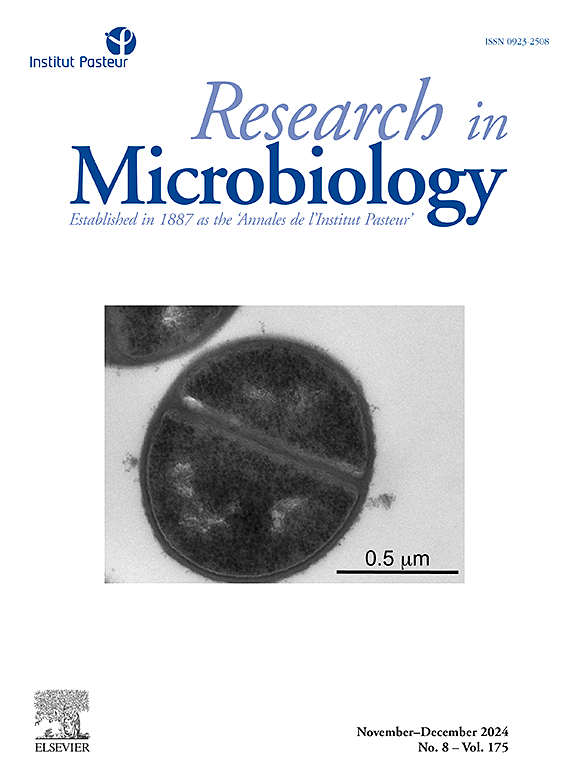铜绿假单胞菌ExoU通过MUC1-C核易位对气道上皮细胞的影响。
IF 3.4
4区 生物学
Q3 MICROBIOLOGY
引用次数: 0
摘要
机会致病菌铜绿假单胞菌(Pseudomonas aeruginosa)在医院获得性肺炎中起着重要作用,ExoU(一种由特定铜绿假单胞菌菌株表达的毒力因子)的分泌与临床预后不良有关。这是由于ExoU的磷脂酶A2活性,引发不受控制的炎症反应,导致严重的病理。在这里,我们深入研究了ExoU对黏液蛋白-1 (MUC1)的影响,MUC1是一种在肺细胞表面具有免疫调节特性的关键黏液成分。我们的研究结果表明,ExoU阴性的铜绿假单胞菌菌株感染人呼吸道上皮细胞可提高MUC1的表达,但细菌分泌ExoU通过JNK通路破坏降低MUC1 mRNA和蛋白水平。有趣的是,尽管整体细胞相关MUC1水平降低,但ExoU促进了MUC1在细胞核内的积累,其中MUC1细胞质尾部(MUC1- c)可能作为转录辅激活因子。值得注意的是,用特异性MUC1-C抑制剂GO-201处理上皮呼吸细胞培养物,可减少ExoU诱导的CXCL-8分泌。从本质上讲,我们的研究强调了产生exou的铜绿假单胞菌菌株在感染过程中如何抑制MUC1的表达,同时增强MUC1- c向细胞核的易位,在细胞核中发挥促炎作用。这种独特的机制揭示了ExoU如何影响宿主对铜绿假单胞菌的防御,从而潜在地损害宿主的健康。本文章由计算机程序翻译,如有差异,请以英文原文为准。
Effect of Pseudomonas aeruginosa ExoU on airway epithelial cells through MUC1-C nuclear translocation
The opportunistic pathogen Pseudomonas aeruginosa plays a significant role in hospital-acquired pneumonia, with the secretion of ExoU - a virulence factor expressed by select P. aeruginosa strains - linked to poor clinical outcomes. This is due to ExoU's phospholipase A2 activity, which triggers an uncontrolled inflammatory response, leading to severe pathologies. Here, we delve into ExoU's impact on mucin-1 (MUC1), a critical mucus component with immunomodulatory properties on pulmonary cell surfaces. Our findings reveal that infection of human respiratory epithelial cells by an ExoU-negative P. aeruginosa strain boosts MUC1 expression, yet ExoU secretion by the bacteria diminishes MUC1 mRNA and protein levels through JNK pathway disruption. Interestingly, despite reduced overall cell-associated MUC1 levels, ExoU prompts MUC1 accumulation within the nucleus, where the MUC1 cytoplasmic tail (MUC1-C) may act as a transcriptional coactivator. Notably, treating epithelial respiratory cell cultures with GO-201, a specific MUC1-C inhibitor, diminished CXCL-8 secretion induced by ExoU. In essence, our study highlights how infection by ExoU-producing P. aeruginosa strains suppresses MUC1 expression during infection, while enhancing MUC1-C translocation to the nucleus, where it plays a pro-inflammatory role. This unique mechanism sheds light on how ExoU can impact the host's defense against P. aeruginosa, potentially compromising host health.
求助全文
通过发布文献求助,成功后即可免费获取论文全文。
去求助
来源期刊

Research in microbiology
生物-微生物学
CiteScore
4.10
自引率
3.80%
发文量
54
审稿时长
16 days
期刊介绍:
Research in Microbiology is the direct descendant of the original Pasteur periodical entitled Annales de l''Institut Pasteur, created in 1887 by Emile Duclaux under the patronage of Louis Pasteur. The Editorial Committee included Chamberland, Grancher, Nocard, Roux and Straus, and the first issue began with Louis Pasteur''s "Lettre sur la Rage" which clearly defines the spirit of the journal:"You have informed me, my dear Duclaux, that you intend to start a monthly collection of articles entitled "Annales de l''Institut Pasteur". You will be rendering a service that will be appreciated by the ever increasing number of young scientists who are attracted to microbiological studies. In your Annales, our laboratory research will of course occupy a central position, but the work from outside groups that you intend to publish will be a source of competitive stimulation for all of us."That first volume included 53 articles as well as critical reviews and book reviews. From that time on, the Annales appeared regularly every month, without interruption, even during the two world wars. Although the journal has undergone many changes over the past 100 years (in the title, the format, the language) reflecting the evolution in scientific publishing, it has consistently maintained the Pasteur tradition by publishing original reports on all aspects of microbiology.
 求助内容:
求助内容: 应助结果提醒方式:
应助结果提醒方式:


